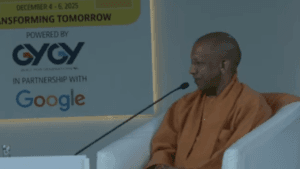People Manager Concludes Largest Inclusive Workplace Conference: Engage-2024
The event emphasized the significance of personal and organizational transformation driven by clearly defined values and purpose statements, and the need for a panel discussion on this valuable belief system.

The conference focuses on the use of AI technology to optimize learning and onboarding programs, as well as the need of building a diverse and inclusive work environment. The program focused on HR’s role in driving employee health initiatives, developing a people-centric culture, and tackling DEI challenges.
The program stressed the importance of personal and organizational transformation through clearly defined values and purpose statements, as well as the need for a panel discussion on this beneficial belief system.
Key highlights from the conference:
1. AI Technology and Customized Learning Paths for Inclusive Workplace
Dr. Vivek Trivedi, founder and CEO of Shikshakji.com and a Zoho partner, spoke about his love for AI technology and its potential to improve learning effectiveness and engagement, as well as tailor training and onboarding programs. He presented many AI-powered solutions and stressed their potential benefits to HR and other companies. He also emphasized the value of tailored learning paths, real-time performance metrics, and ongoing feedback in improving employee engagement and organizational development.
Finally, the conversation focused on AI’s ability to automate tedious work and free up time for employees to focus on creative and strategic endeavors, with examples of its use in diverse industries.
2. Inclusivity, Diversity, and HR Strategies in the AI Age for Inclusive Workplace
Dr. Naipal Singh underlined the need for workplace inclusivity and diversity, particularly when it comes to gender and disability representation. He explained that his organization has a 25% female representation and a 4% representation of individuals with disabilities, and he described numerous programs and procedures in place to promote gender equality and disability inclusion. He also emphasized the importance of accountability and reporting procedures in addressing any discriminatory practices.
The conversation then moved on to the first HR panel, led by Sree Lata Shankar, where members from diverse businesses shared their perspectives on strategic and critical strategies for a more human-centric approach in the age of AI.
3. HR’s Role in Employee Wellness and Business Success at Inclusive Workplace
Sharad Chandra stressed HR’s responsibility in driving employee health initiatives and fostering a people-centric culture through effective policies and talent strategies. Lalit discussed how human-centricity leads to corporate success, as well as how introducing HR-centric practices helped his previous employer cut attrition and expand globally. Srikanth stressed the importance of excellent employee experiences, values, and communication, particularly during the COVID-19 pandemic, when his team assisted employees and their families.
Sharad talked about modifying communication methods, including email and WhatsApp, preserving empathy, and implementing post-Covid policies. Lalit’s organization promoted essential principles such as trust and teamwork through substantial communication initiatives.
4. Implementing New Work Culture and DEI Approaches
The participants talked about the obstacles and strategies for adopting a new work culture, highlighting the significance of empathy, core values, and clear communication. They emphasized the importance of HR in resolving concerns and offering feedback, as well as the need for executives to model the organization’s values. The conversation also centered on implementing Diversity, Equity, and Inclusion (DEI) practices in the workplace, with a focus on attracting a diverse workforce, overcoming stereotypes, and cultivating a positive mindset for change. The speakers discussed their personal experiences and practical examples of how DEI concepts might be utilized in the workplace.
5. Creating Inclusive Work Environments: Strategies and Commitments
The team discussed the importance of creating an inclusive and diverse work environment, with a focus on promoting equality and retaining a diverse workforce. Pujha Khanna, shared her experiences from previous organizations, emphasizing the need for training, employee resource groups, coaching, and mentoring to make employees feel accepted and understood. Sree Lata highlighted the importance of maintaining regular one-to-one connections with employees, integrating new employees into the team through a buddy system, and fostering an open-minded culture. Dr. Naipal from the banking sector shared his organization’s long-standing commitment to diversity, while also discussing the role of top management in ensuring compliance with mandatory guidelines and the realization of DI (Diversity and Inclusion) values.
The conversation closed by emphasizing the necessity of leadership commitment, systematic bias mitigation, inclusivity, and transparency in achieving organizational diversity.
6. Creating Inclusive Workplaces: Strategies and Initiatives
The panelists discussed the importance of creating an inclusive workplace, with Pujha Khanna, Dr. Naipal Singh, and Indwin E Joel sharing insights and strategies. Indwin emphasized the significance of culture measurement, frontline leadership, and employee branding in fostering a positive and inclusive work environment. The CXO panel discussion focused on initiatives to achieve an inclusive and thriving workplace, while K. Vittala Rao highlighted the importance of employee well-being, diversity, equity, and inclusiveness in cultivating a thriving work culture. Despite some technical difficulties, the participants managed to share valuable insights and strategies for building a more inclusive and successful organization.
7. Creating a Positive Work Culture and Employee Well-Being
The attendees talked about the necessity of fostering a happy and transparent work environment, with an emphasis on employee well-being, competency management, and objective evaluation. They stressed HR’s responsibility in bridging the communication gap between management and employees, improving psychological safety, and addressing workplace mental health issues. The conversation also emphasized the importance of good communication skills, spiritual intelligence, and aligning personal vision with the organization’s mission for creating a thriving workplace. The panelists emphasized the necessity of investing in people, establishing clear metrics for monitoring achievement, and cultivating a culture of transparency, honesty, and trust.
8. Creating a Thriving Organizational Culture With Yoga Philosophies
Mithilesh, a performance coach, shared his insights on creating a thriving organizational culture based on the three philosophies of Yoga: Karma, Bhakti, and Gnana. He emphasized the importance of a leader’s belief in their ability to achieve success with their team (Karma), their duty to serve their team (Bhakti), and the unity between a leader and their team (Gnana). Mithilesh also discussed the significance of behaviors in building culture, the correlation between vision, purpose, and values, and the importance of defining and aligning an organization’s values and behaviors to a larger purpose. He shared his experiences in building work cultures in 67 organizations and highlighted how purpose-driven companies are more engaged and productive.
9. Values-Driven Transformation and Leadership Discussion
Mithilesh underlined the necessity of personal and organizational transformation based on well defined values and mission declarations. He highlighted his experiences and discussed a case study in which an intervention resulted in a beneficial shift in leadership style. Mithilesh also discussed the importance of values in the workplace, the organization’s performance evaluation system, and the method for analyzing employee values. The team concluded that a panel discussion on this valuable belief system was necessary, and that a larger event would be planned for November. There were no particular decisions, action items, or open questions raised during this meeting.
Look forward to the conference:
- K Vittala Rao will conduct a workshop on competency design next Sunday from 3-5:30 PM.
- People Manager team to organize a panel discussion on value belief systems in organizations in August.
- People Manager team to launch virtual awards and invite panelists to be part of the jury.
- People Manager team to organize a larger learning and development conference in November.
- People Manager team will feature panelists in cover stories for upcoming monthly magazines.
- Panelists are to write short LinkedIn posts about the session and tag People Manager.
- People Manager team to compile key insights from panelists for the July magazine issue.
- People Manager team will organize physical events starting from 2025.
- People Manager team will celebrate a second anniversary in November 2024.
- Panelists are invited to attend the competency design workshop with K. Vittala Rao next Sunday.
For more HR news and updates, visit our website at People Manager.co.in.
- Union Budget 2026-27 : Yuva Shakti Budget Big Numbers, Slow Payoff - February 4, 2026
- AI in HR: Why ROI Isn’t the Right Question—Yet - September 8, 2025
- The Hidden Cost of Fear in the Workplace: Why Generational Optimism Isn’t Enough - September 2, 2025








